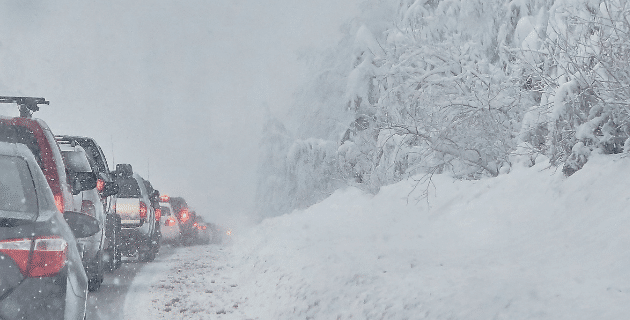When the temperatures dip low, wind speeds hit high, and precipitation is in the forecast, you could be in the path of a winter storm. These powerful acts of nature have the potential to cut off power and trap you and your family in your home for days, and that’s not all… Winter storms have also been associated with hypothermia, frostbite, carbon monoxide poisoning, and even heart attacks.
Being well prepared is your best defense. Follow this guide so you can weather winter storms safely.
Know what to expect when
The National Weather Service issues severe weather alerts for winter storms. While the exact amounts of snow vary based on where you live, here are some general definitions.
-
- Winter storm watch – Conditions are right for hazardous winter weather within 48 hours. It doesn’t mean it will occur, but a winter storm is possible.
- Winter storm advisory – Usually issued within 36 hours of an expected storm, an advisory lets you know to anticipate snow, sleet and/or freezing rain.
- Winter storm warning – Expect snow, sleet, ice, freezing rain and/or hazardous winter conditions within the next 12-24 hours.
Get ready
Your primary concerns during a severe winter storm are the loss of heat, power, and communications, having enough food and supplies, and protecting your home from possible storm damage. Stock up on supplies, take protective measures for your home and create a disaster plan to share with everyone in the family. That may include planning for evacuation if needed.
Stock up and charge up- Building your emergency kit.
-
- Stock up on food that requires no cooking or refrigeration. Make sure you have a manual can opener if you’re planning to open cans.
- Include baby food and diapers if needed.
- Buy cases of bottled water to use in case the pipes freeze. You can use this for brushing teeth, flushing toilets, and bathing. Make sure you have at least 3 gallons of water per person. You can also fill the bathtub with water as an extra source.
- Make sure you have enough prescription medications, and any toiletries needed.
- If you have pets, stock up on food for them.
- Gather your flashlights and extra batteries. Collect candles and matches.
- Pull out the battery-powered radio for weather updates. You can also use it to play music to pass the time.
- Make sure you have lots of blankets and warm clothes for each member of the household.
- Charge all of your devices ahead of the storm. Charge any portable battery backups. Determine how you will charge your phone during a power outage.
Protect your home
-
- Protect your pipes from freezing by covering them with insulation.
-
- Make sure your home’s furnace is in good working order.
- Check for drafts and use these winter window hacks to keep your home warm and toasty.
- Know how to turn off your utilities, such as gas lines or water, in an emergency.
- Consider buying emergency heating equipment such as a wood or coal-burning stove or electric or kerosene heater. Review all safety precautions, and be careful of fire hazards when storing fuel.
- Consider installing a portable generator. Review generator safety and never run a generator in an enclosed space.
- Make sure your smoke detector and carbon monoxide detectors are working. If you’ll be using your fireplace or wood stove for heat, they should be near that area. Have a fire extinguisher nearby just in case, or try this way to put out fires without an extinguisher.
- Test your snow blower and have it serviced if necessary.
- Take a walk around your house and identify any trees that could fall. If there’s time, trim them back.
Be prepared to leave if needed
-
- Service your vehicle and make sure you’re prepared for winter. Have a mechanic check your antifreeze, windshield-washer fluid, defroster, wipers, battery, brakes, and tires.
- Keep your car’s gas tank full for emergency use.
- Stock your car with these must-carry items.
- Research local shelters and warming stations in your area in case you need to evacuate your home.
- Prepack a bag for each member of the family, including pets.
Once the Storm Arrives
During the storm…
-
- Limit your time outside. Hypothermia and frostbite are real dangers.
- Do not attempt to travel during treacherous conditions. You could find yourself in an accident or stranded on the road.
- Stay tuned to emergency weather alerts.
- Check on neighbors if they’re older or have young children who are more at risk in extreme cold.
After the storm…
-
- Avoid driving until conditions have improved. Follow winter driving safety guidelines.
- Keep a supply of kitty litter and/or ice melt to clear sidewalks.
- Be careful to not overexert yourself. It’s common for heart attacks to be brought on by overexertion from shoveling or clearing snow.
- Assess any damage to your home or property and alert your insurance company. You have home insurance for a reason. Put it to work if you need it.
This article is furnished by California Casualty, providing auto and home insurance to educators, law enforcement officers, firefighters, and nurses. Get a quote at 1.866.704.8614 or www.calcas.com.
- Graduation – When to Remove Your Child from Your Auto Policy - May 18, 2023
- How to Prevent Catalytic Converter Theft - May 17, 2023
- How Much Does Home Insurance Cost? - May 17, 2023

